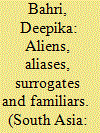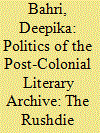| Srl | Item |
| 1 |
ID:
120703


|
|
|
|
|
| Publication |
2013.
|
| Summary/Abstract |
In this essay, I argue that alienation and familiarity serve as mobile matrices for understanding the affectively experienced impact of transnational migration in certain of Jhumpa Lahiri's short stories. While we may think of alienation as a precondition of migrant identity, it is a condition that is familiar to most of us in different contexts. How does alienation, thus plurally conceived, figure in the experience of migrants, producing the relay between heimlich/unheimlich experiences? Moreover, in the socio-cultural context of globalisation, how does transnational migration challenge conventional notions of family, a word associated with notions of familiarity and filiation that are seemingly antonymous to the idea of alienation? These are the questions I set out to answer, concluding that the 'family' is always a unit composed by its very hauntings, surrogates, and absences.
|
|
|
|
|
|
|
|
|
|
|
|
|
|
|
|
| 2 |
ID:
184802


|
|
|
|
|
| Summary/Abstract |
Using the Rushdie papers as a case study, this essay discusses questions of commodification, access, preservation and cultural nationalism related to the acquisition of the literary archives of post-colonial authors. Who should own this archive? What is the archival fate of writers with a tenuous relationship with their place of birth? Finally, how does the well-guarded, commodified, expensively acquired archive privilege aura and secrecy over the treasures in the readily available, published literary corpus? This reading suggests that we need to attend equally to the aesthetic value of the literary imagination as part of the discussion in archival studies.
|
|
|
|
|
|
|
|
|
|
|
|
|
|
|
|